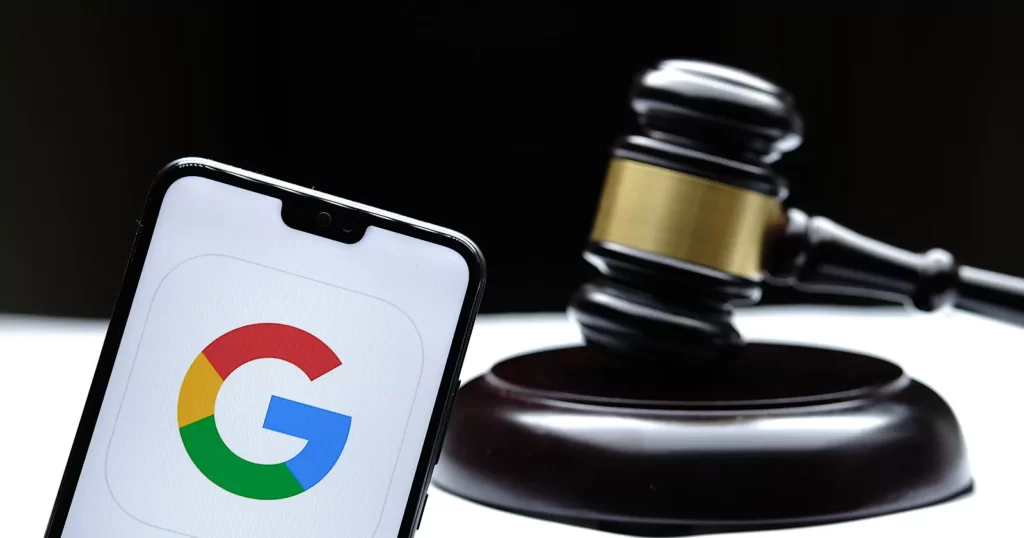The US Justice Department has launched one of the biggest challenges against Google, one of the largest tech companies globally. In a significant Google’s Antitrust trial, the government argues that Google’s dominance isn’t solely due to a well-designed product but rather the result of coercive deals that have stifled competition in the search engine market. Google, on the other hand, contends that it’s being penalized for its success.

Despite the magnitude of the trial, it began relatively quietly. There were only a few early arrivals at the courthouse, and the initial crowd was small. However, as the day went on, more people filled the courtroom, with additional attendees in overflow and media rooms. The trial is expected to last for 10 weeks, and various observers, including those with humorous intentions, have shown interest in the proceedings.
The case against Google revolves around allegations that the company used anti-competitive tactics starting around 2010 to maintain its dominant position in the search engine market. The US Justice Department contends that Google solidified its monopoly by leveraging what it calls the “power of defaults.” This involved striking deals to become the default search engine on various platforms, such as Apple’s Safari browser and Mozilla’s Firefox, and requiring Android device manufacturers to prominently feature a Google search widget on phones through the Mobile Application Distribution Agreement (MADA).
Additionally, Google used the vast amount of search data it collected to continuously improve its search engine, creating a feedback loop that has made it extremely difficult for competitors to challenge its dominance. The trial is seen as critical for determining the future of competition in the internet search market.
The trial of US v. Google marks a significant effort by the US Justice Department to challenge the power and growth of major tech companies. This lawsuit is the most significant antitrust action since the 1990s when the government took legal action against Microsoft for anti-competitive practices, particularly concerning its web browsers on the Windows operating system. However, recent legal battles have shown that tech giants have been successful in defending their practices. For instance, Apple successfully argued that its closed iOS ecosystem benefits consumers, while Microsoft won approval to acquire Activision Blizzard. In both cases, these companies convinced judges that their actions were pro-consumer and framed the allegations as coming from competitors unable to compete fairly.
Google’s defense in the US v. Google case involves arguing that preventing Google from competing wouldn’t necessarily lead to better performance from its competitors like Yahoo or DuckDuckGo. The company’s attorneys are emphasizing that the situations between the 1990s Microsoft case and the current antitrust case against Google are different. They contend that people overwhelmingly and voluntarily choose Google over alternatives, implying that Google’s popularity is due to user preference rather than anti-competitive practices. Additionally, Google argues that its default search deals benefit web browsers by providing essential revenue and that its Android agreements contribute to creating a viable mobile competitor to iOS.
The Justice Department’s approach in the case against Google involves focusing on internal communications obtained during its investigations. They are highlighting memos and emails where Google discusses the value it gains from being the default search option and messages that outline terms for non-Google search services. The goal is to show that Google’s actions primarily benefit itself rather than consumers.
The Justice Department is drawing parallels to the Microsoft antitrust case but in a more complex manner. In the Microsoft case, there were explicit statements about “cutting off Netscape’s air supply” in the browser wars. In Google’s case, the government is pointing to communications where Google employees avoid using terms that could raise antitrust concerns.
The strategy is to build a case that demonstrates how Google’s actions and agreements with partners are anticompetitive and maintain its monopoly in the search market.
Linguistic Scrutiny Takes Center Stage in Google’s Antitrust Trial
In the opening week of the antitrust trial against Google, the Justice Department has directed its focus towards the tech giant’s careful choice of language. The first witness called was Google’s chief economist, Hal Varian, who was questioned about email exchanges related to Google’s search business. In one exchange, Varian expressed concern when Marissa Mayer, then overseeing Google’s homepage, used the term “market share,” which could imply overall market dominance. Varian suggested using “query share” instead, emphasizing the need for consistency.
Another email chain revealed Google’s caution in avoiding specific terms such as “network effects,” “scale,” “bundle,” or “tie.” These concerns trace back to at least 2003 when Varian advised Google employees to be “sensitive” to perceptions of monopolistic behavior. The trial is shedding light on Google’s strategic language choices and their potential implications in antitrust matters.
The Justice Department dissected claims made by Google’s economist, Hal Varian, in 2009 regarding the importance of data from user searches to search engine quality. They highlighted an email chain in which a Google engineer, Udi Manber, contradicted Varian’s dismissal of the importance of data-sharing in a Microsoft-Yahoo pact. Manber argued that scale was indeed crucial, and if Microsoft had Google’s traffic, their quality would improve significantly, while Google’s quality would drop if they had Microsoft’s traffic.
Varian countered that the Justice Department was overstating the importance of the disagreement and claimed that he acknowledged scale mattered but produced diminishing returns. The Justice Department’s strategy involved reading paragraphs of emails in court to emphasize Google’s internal rhetoric rather than its public-facing explanations for its deals like the Mobile Application Distribution Agreement (MADA) or the Safari agreement. This approach seemed to frustrate both Varian and Google’s attorneys.
The strategy aims to highlight Google’s internal discussions and actions rather than its public explanations for its agreements with partners.
Default Settings Take Center Stage in Google’s Antitrust Trial
In the ongoing antitrust trial against Google, the Justice Department has repeatedly emphasized the significance of default settings. Key witnesses, including Google’s chief economist Hal Varian and former employee Chris Barton, discussed the importance of striking deals with mobile phone makers and carriers to secure Google’s default status. Google’s argument centers on the notion that such agreements are a form of legitimate competition, similar to practices by companies like Microsoft, which sets Bing as the default search option on Windows computers.
To counter Google’s argument, the Justice Department enlisted the expertise of CalTech behavioral economics professor Antonio Rangel. Rangel presented the idea that search engine defaults create a substantial and durable bias toward the preselected option, citing examples of defaults significantly influencing choices, such as opt-in organ donor programs. In cross-examination, Google questioned Rangel’s conclusions, highlighting that Bing’s default placements haven’t provided Microsoft with comparable success.
While Google faces increased antitrust scrutiny, Microsoft’s Bing has somewhat become a punching bag in this trial, despite the potential benefits it could reap from Google’s legal challenges.
Google’s Antitrust Trial Raises Questions About Consumer Harm Standard
In the ongoing antitrust trial against Google, Judge Mehta appears to be delving into how the case aligns with America’s consumer harm standard for antitrust judgments. One of the central questions revolves around whether the average user genuinely experiences harm when Google Search, a free service, makes it slightly more challenging to access alternatives.
The Justice Department contends that Google’s unfair competition strategies, particularly its pay-for-play practices, have allowed it to avoid making improvements to Search that would genuinely benefit users. While the trial’s first week hasn’t fully explored this aspect, one example presented is Google’s lax privacy standards. If Google faced real competition instead of leveraging its dominant position, it might be compelled to enhance data protection measures.
Additionally, there’s a consideration for advertisers who use Google’s advertising system. Although advertising isn’t the primary focus of this case, it plays a pivotal role in Google’s revenue generation. Critics argue that Google’s level of power allows it to unfairly dictate prices to advertisers, which will be a key point raised by a coalition of states later in the trial.
The trial continues to shed light on the complexities of antitrust issues in the digital age, where questions of consumer harm extend beyond monetary costs to encompass issues like data privacy and competition.
Related: Google’s Antitrust Showdown – Challenging the Internet Search Giant’s Dominance in the Digital Era
Antitrust Trial Against Google Continues with High-Profile Witnesses and Legal Battles Ahead
The antitrust trial against Google is set to continue throughout September and early October, featuring a roster of current and former Google employees, including CEO Sundar Pichai. Apple executives, such as Eddy Cue, are also expected to provide testimony, alongside Neeva co-founder Sridhar Ramaswamy, whose search engine was mentioned in the trial’s opening arguments. Google will have the opportunity to cross-examine witnesses and challenge the Justice Department’s claims. However, Google’s full defense is not expected until late October, following arguments from state attorneys general.
A key question in this trial is whether Judge Mehta can be convinced that consumer harm applies to free products like search engines. Tech companies have historically been challenging to hold accountable for antitrust violations, and Google has various defenses at its disposal. While Microsoft recently won an antitrust case by arguing that it was lagging behind a competitor (Sony), Google asserts that it is the superior option in the market. The central debate revolves around whether Google’s dominance is due to excellence or, as the Justice Department contends, because it is just marginally better than alternatives.
The trial will continue to unfold, potentially revealing crucial information about Google’s practices and the legal boundaries in the tech industry.









